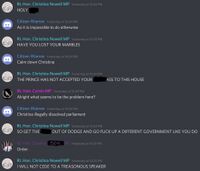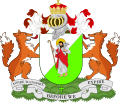2020 New Eiffelic political crisis
| Part of the crisis in New Eiffel | |
| Date | 28 April–25 May 2020 |
|---|---|
| Location | Principality of New Eiffel |
| Participants | |
| Outcome |
|
The 2020 New Eiffelic political crisis, formerly known during said crisis as the 2020 New Eiffelic constitutional crisis, was a political crisis part of the wider crisis in the now-erstwhile Principality of New Eiffel that lasted between 28 April and 25 May 2020.
The background to the crisis begins on 20 April, when Janus Smith, Prime Minister of New Eiffel, was removed through a motion of no confidence for his lack of action during the 2019–20 New Eiffelic constitution crisis between 14 December 2019 and 1 April 2020. He was replaced with Christina Nowell, who was Leader of the Opposition. On 28 April, during a session of parliament called by politician Leon Montan, Björk proposed two separate motions declaring in total three members of parliament. After she declared that they had passed, Nowell informed her that royal assent from Prince Zabëlle I was required; subsequently, a series of verbal altercations followed culminating in the apparent illegitimate dissolution of parliament.
Nowell accused Björk and her allies of attempting a coup d'état over New Eiffel, while Zabëlle I stated that Björk had been acting in good faith. A provisional government was established on 1 May with the intention of holding national elections. Organised by Jayden Lycon of the Cupertino Electoral Supervisory Commission, submissions for candidacy opened on 7 May, with the election commencing between 23–25 May and thus ending the crisis. Independent candidate Nicholas Randouler was elected, but he suffered from an intracranial aneurysm that same day. Attempts to relieve the swelling were unsuccessful, and he died on 3 June, with his death becoming public knowledge in New Eiffel on 8 June.
Background
Context
- See also: Crisis in New Eiffel#Background
The Principality of New Eiffel was a micronation located within the United Kingdom that was founded by Zabëlle Skye—who crowned himself Prince of the micronation as Zabëlle I—on 11 August 2018. It succeeded the earlier Republic (31 December 2017–4 June 2018) and Kingdom of New Finland (4 June–11 August 2018), both also established by Zabëlle I; though, he did not initially serve as the head of state of the Kingdom. On 1 March 2019, the first constitution of New Eiffel was adopted. Written by Zabëlle I himself, it was the foundational document for the legal and political structure of the micronation, although the December 2018 elections for the prime minister had commenced independently from it. The constitution was stored on Apple's note-taking app, Notes.
According to the Royal Archives—the former national archives of New Eiffel which now preserve the erstwhile micronation's history—the political structure of the micronation was "abysmal". Zabëlle I was more interested in the infrastructure (particularly transport), media and culture of the micronation to the point of neglecting the development of a functional political structure. In mid-December, following the Elijahgate scandal between 27 November and 1 December 2019—consisting of a covert plan by Elijah M of the New Eiffelic Party of Individualism and Janus Smith of the Yellow Party to convert New Eiffel into a voluntary, government-less anarcho-capitalist micronation (a micrononstate)—and the upcoming general election on 25 December, many citizens wanted to be able to view the laws of New Eiffel.
Adoption of a new constitution

On 14 December, while attempting to copy and paste the constitution from the Notes app onto an online document so that anyone could view it, Zabëlle I inadvertently lost the only known copy. He announced this on the national Discord server that same day to a critical response from politicians. The lack of a constitution meant that many of New Eiffel's laws were in dispute, bringing the micronation's political situation into a legal standstill. Following the crisis, which was prolonged by a confusing electoral process, the lack of action from political parties and disinterest from Prime Minister Smith, a new constitution was officially adopted on 1 April 2020, which was written by the non-New Eiffelic citizen James Frisch.
In Article III "The Prince-in-Parliament", clause 6 of the constitution states the following:
The Parliament may enact legislation by the majority of the votes of present members in the chamber, as well as the assent of the Monarch.
Royal assent is the method by which a monarch must formally approve an act of the legislature before it may pass.
Motion of no confidence against Smith
The lack of action from Smith during the constitution crisis prompted harsh criticism; he was also largely inactive within New Eiffelic politics as a whole—in spite of being the head of government. Though Zabëlle I remained publicly apolitical, as early as 4 April, he had attempted several times to convince Smith to call a general election. Zabëlle I also frequently stated his dissatisfaction with Smith's lack of activity in private; that same day, he told Leon Montan, leader of the Communist Party (later the Labour Party), that he was pondering whether a vote of no confidence should be held against Smith. He also alleged to Björk that Smith had "refused to call parliament a few times."
On 20 April, Christina Nowell, leader of the Coalition, proposed the motion of no confidence against Smith, which was supported in parliament by Björk. Manuel Maria of the New Effelic Right Hand abstained. The motion passed, and Nowell was chosen to succeed Smith as interim Prime Minister on the approval of Björk and Zabëlle I due to her role as leader of the opposition, despite this not being stated in the constitution.
Troubled parliamentary session

On 28 April, a session of parliament was called by Björk who was the speaker of the house; Zabëlle I did not attend, presumably because he was asleep. Björk proposed two separate motions declaring new members of parliament; the first motion proposed to include Corvin (who was not present at the time), leader of the Libertarian Party, followed by Luke Warren and Pun Watta[b] of Björk's Communist Party in the second motion. After the motions were declared to have passed by Björk, Nowell informed her that royal assent was required, at which point Warren proposed removing this requirement. Björk made a motion to instead replace it with the ability for Zabëlle I to veto any bill. Nowell declared that their proposes were unconstitutional and called a snap election, which Björk and the other members of parliament called unconstitutional in response.
After Björk's motion to cancel the election passed without royal assent, Nowell dissolved parliament. Björk and Warren alleged that this move was "illegal" and proposed another motion to declare the dissolution as illegitimate; subsequently, Nowell declared that parliament was illegitimate. During this time, Corvin arrived and attempted unsuccessfully to mediate. Björk and Warren held a second vote to say that her dissolution of parliament was illegitimate again while Nowell became frustrated. Björk closed the session and later removed Warren and Watta as members of parliament.[c] Parliament was subsequently left in disarray, with confusion over whether any of the motions were legitimate. Björk later explained on 29 April that his proposal to replace royal assent with a veto vote was so that parliament could function while Zabëlle I was asleep. That same day, Zabëlle I was temporarily declared an absolute monarch by the members of parliament as the legal existence of the government was uncertain.
Nowell's concerns

On 30 April, Nowell, a royalist, privately expressed her concerns to Zabëlle I regarding Björk, whom she accused of power-grabbing, and Warren, who she accused of being in favour of attempting a coup d'état over New Eiffel, calling the two as well as Watta "miniature dictators". She further accused Björk of being against the monarchy for partly supporting Warren's proposal to remove the requirement of royal assent, and recommended to Zabëlle I that he take full control over the micronation before Björk and Warren could.
However, Zabëlle I declined, believing that if he were to commit a coup d'état it would transform New Eiffel into a one man nation as the other four residents were no longer interested in participating in the micronation. Additionally, while he disliked Warren, he contrasted Nowell by believing that Björk had been acting in good faith. Nowell disagreed with Zabëlle I's choice, telling him that Björk was "acting as a monarch" and recommending that, at the minimum, his role as speaker of house be removed. She concluded by saying "good job on trusting him with NE [New Eiffel], cause now you're gonna lose NE".
Transitional government
On 1 May at 1:34 a.m., Björk proposed to Zabëlle I that a provisional government (also known as a transitional government) be temporarily established with the goal of holding national elections within "like 2 months". Her justification was so that the government could once again function as a democracy. Additionally, this upcoming election would be the first national election in which online citizens are able to vote. Zabëlle I approved the transitional government, stating that this would "definitely fix up things before the official election" and gave his full consent for the establishment of this temporary government. That same day at 9:00 a.m., the Transitional Government of New Eiffel was formally established via national decree.
The document, written by Björk, stated that the transitional government was the "solution to the problems that caused the crisis; electoral mismanagement and sectarianism within groups opposing the Yellow Party of New Eiffel". Parliament, renamed the transitional legislature, was reduced to seven voting seats and one permanent seat for the monarch. On the approval of Zabëlle I, a vote was held that same day in the transitional legislature which passed and appointed Björk as the First Minister—which was a role synonymous with Prime Minister—Nowell the Deputy First Minister and Watta the Chair of the Transitional Legislature.
Nowell and Björk found each other difficult to work with and frequently clashed; on 3 May, Björk asked Zabëlle I if he could dismiss Nowell from her position, to which he declined and told Björk to "try harder [to work with her]". Two hours later, Nowell blocked Björk's account on Discord. On 4 May, Nowell requested that Zabëlle I relieve her from the position of Deputy First Minister while intending to remain as a member of the transitional legislature. She elaborated that "I cannot stand to watch as the nation I love dies without care being delivered unto it by the royally endorsed power grabs [who intend] to kill the nation." Zabëlle I regretfully accepted her resignation. She also shared a screenshot of Björk stating "oh g*d oh f**k moment [asterisks added]" and "im boutta take power in new eiffel [sic]" in response to being appointed as the First Minister three days earlier.
National election

As a member state of the Cupertino Alliance—an intermicronational organisation—New Eiffel was eligible for the Cupertino Electoral Supervisory Commission, a non-partisan agency responsible for administering elections and referendums in the Cupertino Alliance's member states. By 7 May, Jayden Lycon, then-Chairman of the Alliance, became responsible for organising the elections.
Submissions for candidacy opened that same day, with the Labour Party run by Björk, Independent Party run by Nicholas Randouler, Libertarian Party run by Corvin and and the Right Hand run by Maria all submitting party lists that same day. Lycon later ran for the Independent Party alongside Randouler; and Warren of the Liberal Egalitarian Party (later the Liberal Democrat Party) and Nowell of the Coalition Party both announced their candidacies. The Coalition Party originally also had three other candidates, but they were ineligible to run as they were not citizens of the micronation prior to the announcement of the election. Both Björk and Warren accused Nowell of attempting to illegally gain more votes, which she denied. Watta and Isaac "Cadno" Richards, the latter the proposer of the Maslow Initiative, also ran for the Labour Party.
Voting, for which all citizens were eligible, occurred between 23–25 May; 13 votes were cast out of 22 eligible voters, indicating a voter turnout rate of 59 percent. The ballot, hosted on Google Forms, also included a survey: Zabëlle I was near-universally liked by voters; most voters ranked Björk's term as First Minister as favourable, while the reception to the "previous government" ranged from mixed to positive, who two voters declaring it terrible. Almost all voters (12) supported full LGBT rights; 8 supported extending New Eiffel's previous COVID-19 lockdown; and 7 believed that New Eiffel should be a constitutional monarchy while 4 voters declared it should be a kingdom.
Randouler and Lycon of the Independent Party received four votes (30.8 percent), one more than Björk and Corvin who both received three votes each (23.0 percent); the other three parties each received a single vote (7.7 percent), possibly themselves. The results were announced on 25 May via the Cupertino Alliance's YouTube channel. As the leader of the party, Randouler was elected as the first ever Prime Minister of New Eiffel who was not a physical resident of the micronation. He announced that he would soon be drafting a list of the "stuff we would like to achieve in the coming days". However, Randouler suffered a seizure at his home in Ohio later that day, and did not regain consciousness. He was admitted to hospital, where he was later diagnosed with an intracranial aneurysm. Attempts to relieve the swelling were unsuccessful, and he died on 3 June. His death was only discovered on 8 June via the publication of an obituary online.
Footnotes
- ↑ The colours represent the flag of anarcho-capitalism, Smith's alleged but unconfirmed ideology at the time; see Elijahgate for context.
- ↑ It is not known whether Watta was present during this session.
- ↑ As Corvin was not a member of the Communist Party, he could not be removed by Björk herself.

